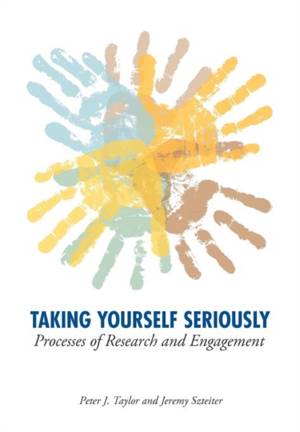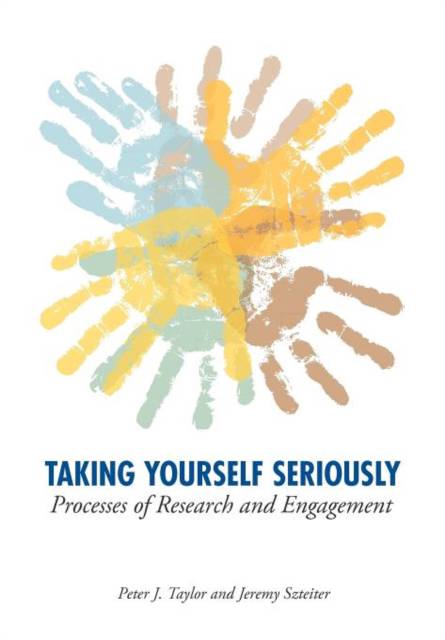
En raison d'une grêve chez bpost, votre commande pourrait être retardée. Vous avez besoin d’un livre rapidement ? Nos magasins vous accueillent à bras ouverts !
- Retrait gratuit dans votre magasin Club
- 7.000.000 titres dans notre catalogue
- Payer en toute sécurité
- Toujours un magasin près de chez vous
En raison de la grêve chez bpost, votre commande pourrait être retardée. Vous avez besoin d’un livre rapidement ? Nos magasins vous accueillent à bras ouverts !
- Retrait gratuit dans votre magasin Club
- 7.000.0000 titres dans notre catalogue
- Payer en toute sécurité
- Toujours un magasin près de chez vous
Taking Yourself Seriously
Processes of Research and Engagement
Peter John Taylor, Jeremy Szteiter
Livre broché | Anglais
20,95 €
+ 41 points
Format
Description
Taking Yourself Seriously: Processes of Research and Engagement is designed for college students as well as more experienced professionals who want to further their development as researchers, writers, and agents of change. A wide range of tools and processes for research, writing, and collaboration are defined and described-from Governing Question to GOSP, Plus-Delta feedback to Process Review, and Supportive Listening to Sense of Place Map. The tools and processes are linked to three frameworks that lend themselves to adaptation by teachers and other advisors: A set of ten Phases of Research and Engagement, which researchers move through and later revisit in light of other people's responses to work in progress and what is learned using tools from the other phases; Cycles and Epicycles of Action Research, which emphasizes reflection and dialogue to shape ideas about what action is needed and how to build a constituency to implement the change; and Creative Habits for Synthesis of theory and practice. Researchers and writers working under these frameworks participate in Dialogue around Written Work and in Making Space for Taking Initiative In and Through Relationships. These processes help researchers and writers align their questions and ideas, aspirations, ability to take or influence action, and relationships with other people. Bringing those dimensions of research and engagement into alignment is the crux of taking yourself seriously. The tools, processes, and frameworks are illustrated through excerpts from two projects: one engaging adult learning communities in using the principles of theater arts to prepare them to create social change; the other involving collaborative play among teachers in curriculum planning. A final section provides entry points for students and educators to explore insights, experiences, and information from a wider world of research, writing, and engagement in change.
Spécifications
Parties prenantes
- Auteur(s) :
- Editeur:
Contenu
- Nombre de pages :
- 286
- Langue:
- Anglais
Caractéristiques
- EAN:
- 9780984921607
- Date de parution :
- 09-01-12
- Format:
- Livre broché
- Format numérique:
- Trade paperback (VS)
- Dimensions :
- 170 mm x 244 mm
- Poids :
- 458 g

Les avis
Nous publions uniquement les avis qui respectent les conditions requises. Consultez nos conditions pour les avis.






